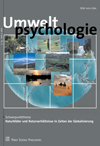Artikeldetails
 Magdalena Sawicka (2005),
Magdalena Sawicka (2005),Die Rolle von Naturbildern bei der Meinungsbildung über grüne Gentechnik
Eine deutsch-amerikanische Vergleichsstudie .
Umweltpsychologie 9(2), 126-144.
Dieser Artikel wurde in deutsch verfasst.
| Zusammenfassung: | Die deutsche Bevölkerung steht gentechnisch veränderten Nahrungsmitteln deutlich kritischer gegenüber als die US-amerikanische Bevölkerung. Ziel der nachfolgend beschriebenen Rezeptionsstudie war es, das Potential interkulturell differierender Naturbilder für die Erklärung der Einstellungsunterschiede zu untersuchen. Hierzu wurde eine Methode entwickelt, die – unter Rückgriff auf Theorien der Rezeptionsforschung und Kultursoziologie – den Einfluss von Naturbildern beim individuellen Prozess der Meinungsbildung zum Thema grüne Gentechnik untersucht. Die Studie zeigt, dass die Naturbilder bei der Meinungsbildung in der Tat eine gewisse Rolle spielen. Bei diesem Prozess verweisen die US-amerikanischen Testpersonen häufiger auf Natur als die deutschen Testpersonen. Hinsichtlich der Art der Verweise gibt es jedoch keinen Unterschied zwischen den Ländern. Dieses widerspricht insofern den Erwartungen, als das bei der parallel durchgeführten Befragung ermittelte ökozentrischere Naturbild der Deutschen auch eine entsprechend stärkere Bedeutung dieser Kategorie bei der Meinungsbildung erwarten ließ. Schlussfolgernd kann gesagt werden, dass Naturbilder einen Teil der intrakulturellen Einstellungsunterschiede zur grünen Gentechnik erklären; ihre Bedeutung zur Erklärung interkultureller Einstellungsunterschiede ist jedoch komplexer als erwartet. |
| Schlagworte: | Grüne Gentechnik Kultur Meinungsbildung Naturbilder Naturvorstellungen |
| Abstract: | The role of concepts of nature in opinion formation about food biotechnology – a German–American comparative study German society is more critical of the genetic modification of food than American society. The aim of the reception study presented below was to explore the potential of inter-culturally differing concepts of nature for explaining these differences in attitudes. A method was therefore designed – by combining theories of reception and cultural sociology – that explored the impact of concepts of nature on the individual process of opinion formation about the issue of food biotechnology. The study shows that the concepts of nature do indeed play a role in opinion formation. In this process, the American test subjects refer more often to nature than the German test subjects. However, with respect to the kind of references there is no difference between the two countries. This is unexpected since the more ecocentric concept of nature among Germans that was revealed by a survey conducted in parallel promised a corresponding relevance of this category in opinion formation. The conclusion is that concepts of nature help to understand intra-cultural differences in attitudes toward food biotechnology, but their relevance for the explanation of inter-cultural differences in attitudes is more complex than expected. |
| Keywords: | Concepts Of Nature Culture Food Biotechnology Opinion Formation Perception Of Nature |
Zum Inhaltsverzeichnis

